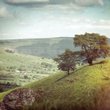|
|

Last Days If Last Days' 2006 debut Sea represented a shift in n5MD's philosophy, from its clinical electronic roots to more expressive sounds, then its follow-up These Places Are Now Ruins, just might be the one that cements their position as the true exponents of affecting, electronic-based compositions. This album finds Graham Richardson creating some of the most poignant sounds out there at this current time. Sea blurred the line between digital studio manipulation and acoustic instrumentation. It was notable for a strong narrative that ran through it. The narrative detailed a faceless character's disillusionment with his life and his bid to escape from its shackles (journeying to a new land on a small boat). Such sentiments are prevalent in everyday life, around the globe, for example, people continually strive to make a better life for themselves. Richardson again sets out on a journey on These Places Are Now Ruins, not physically as such, but as an autobiographical exploration recounting his past while contemplating the present (and possibly the future). Again, these are issues that can be found within every walk of life. But conveying such honesty is a difficult task through musical composition. This is where Richardson excels. He avoids the pitfalls of an over-bearing digital production and instead comfortably anchors the album at the lo-fidelity end of the spectrum that allows These Places... to nurture its nature of integrity. Many of the tracks here feature glimmers of static or other found sounds, as if they have been recorded on vintage radio equipment. It is touches like this that only reinforce Richardsonís sentiments of sincerity. "A Storm Tore This House" starts with a solemn repetitive piano drone, much like the tolling of a large cathedral bell, which is soon enveloped in a foggy cloud of static. Perhaps the storm is to be taken figuratively; whatever may be the case the static and controlled distortion intensifies as Richardson scratches sounds, created from kicking timber around his room, across the mix. The Ďstormí soon dies away as sounds of birds basking in clear skies can be heard. The field recordings throughout gives These Places... an earthly feel, a sense of openness, if you will. "Reasons to Go" features gorgeous guitar picking that gives an air of serenity. But this is contrasted by the chaotic sounds of the night around Richardsonís hometown of Edinburgh. You can almost picture Richardson, sitting at his window, plucking his guitar as the busy nightlife of Scotlandís capital unfolds in front of him. On tracks such as "The Whole Town Is Against Us", Richardson guides us into contemplating our own past. Amidst the degraded ambiance, muffled distortion and Sigur Ros' style percussion, the listener will find themselves questioning their own choices. Did I say the right words?, did I do the right thing?, have I chosen the correct paths. These are questions that crop up during periods of uncertainty, after all just about every person has at least one regret. "Two Halves of a Line" works in a similar manner, the optimistic guitar awakens a fleeting sense of euphoria, but the broken computer-board static sounds ensure that we are aware that things are not always as they seem. As an album notable for its poignancy, the most gorgeous moment occurs precisely one minute and forty five seconds into "Look After Yourself". Surrounded by a revolving guitar refrain and mournful orchestration, Richardson unleashes beautiful glockenspiel chimes that free an intense amount of tension. It provides the sort of release that many bands aim for, but will never achieve. In the end, as the plaintive "Traveling Heart" draws to a close, what we are left with is the perfect sequel to Sea. A release where Deaf Center's cinematic qualities are channeled through Jasper TX's lo-fi sensibility. These Place Are Now Ruins is simply an enthralling piece of work. It portrays Graham Richardson as an honest artist, unafraid to express his innermost feelings on life. His delicate compositions, at times, seem on the verge of collapse, but just like life itself there are flickers of hope peppered throughout. And as many a philosopher will tell you, hope is important. Copyright © 2007 Michael Henaghan
|
| © 2011 Luna Kafé |